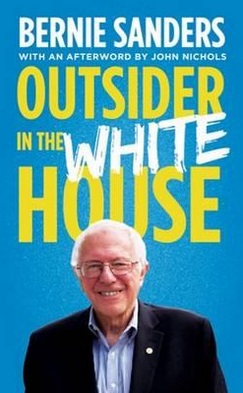 |
|
 |
|
 |
 |
 |
 |
 |
 |
 |
 |
 |
 |
| 2016 Election: | Hillary's book | Trump's book | Bernie's book | Ted Cruz's book | | | 2016 Senate Debates |
Outsider in the White House by Bernie Sanders  (Click for Amazon book review)
BOOK REVIEW by OnTheIssues.org:
This book is a re-packaging of Sanders' 1997 book, Outsider in the House, with a new introduction and a new afterword written for the September 2015 re-release. Our 2015 excerpts are from the new introduction and a new afterword. The bulk of the book is the same autobiography as the 1997 book -- Bernie's rise to political power through campaigns for Mayor of Burlington and then his election to the U.S. House -- which we discuss in our review of the earlier version -- so we'll focus in this review on the 2016 political campaign. Sanders describes in this book purposes of political campaigns other than winning election -- such as "raising the right issues" and "shifting the framework of the debate." In the 2015-2016 presidential campaign, Sanders has single-handedly created a meaningful Democratic primary, where the "right issues" get discussed because Sanders' candidacy has "shifted the framework of the debate." Party insiders prefer coronations without opposition -- but some say that's bad for both the candidates and the voters. Sanders' presence means Hillary gets to hone her debate skills for the general election, and voters get to see how Hillary responds to challenges from the left. Sanders has accomplished those two things single-handedly: none of the other Democratic contenders were far enough left nor had enough followers. But we predict Sanders will drop out when his delegate numbers become untenable -- shortly after March 15 (details below). In his exit speech, we predict Sanders will claim to have accomplished the challenging task of exposing and altering Hillary's point of view on corporations, on free trade, and on a couple of other issues. But he won’t mention his most important political role: he made Hillary fight for the nomination, which prepares her better for the general election. Why do we predict Sanders will withdraw, even after his strong showing in the Iowa caucus and the New Hampshire primary? Because the numbers simply don't add up, and presidential nominations are about numbers adding up. Iowa and New Hampshire are small states, and the convention delegates awarded in those contests get split among the participants. Sanders' strong showings in early contests won him some delegates -- but barely made a dent in Hillary Clinton's lead. Clinton's lead comes from the 712 "superdelegates" who will vote at the Democratic Convention -- Hillary leads Bernie by about 500-8 at the time of the early contests. That's 500 delegates out of 2,240 needed to win the convention -- which will become insurmountable by late March. Here are the numbers in detail:
* PLEOs are Party Leaders and Elected Officials; from the Democratic National Committee or members of Congress, Governors, etc. Obama beat Hillary in the caucuses in 2008 by "community organizing". Can Bernie do the same? No, not this time! Hillary learned her lesson about the caucus process (which are typically one-hour meetings at odd times in odd places like church basements). In the caucus context, "community organizing" means getting the party regulars -- the people who host and attend caucuses -- on your side. We predict Bernie will split all of the caucuses with Hillary, because of Obama's progressive leftovers. But Hillary will win the primaries as overwhelmingly as she did in 2008 -- plus she has all those superdelegates already. We look at the math below using that formula. Sanders supporters might say, "In January 2008, Hillary was seen as the prohibitive frontrunner, and Obama was in a distant second place, just like Bernie." That's true, and Obama won the Iowa caucuses and went on to win every subsequent caucus except one. Even though Hillary won MOST primaries, but it wasn't enough to catch up. Look at the list by state:
Can Bernie repeat what Obama did in 2008? Let's look at the math, accounting for Hillary's current lead in superdelegates, too. Realistically, the caucuses and primaries are not held all in one day. There are two "Super Tuesday" events in March: By March 1, the first Super Tuesday, 1,012 delegates will be elected. By March 15, the second Super Tuesday, 2,016 delegates will be elected. Applying our ratios above to the first Super Tuesday, the results will be:
We predict that after March 1, O'Malley will withdraw; let's assign all of his delegates to Sanders (since they are "anti-Hillary" delegates). Then let's apply the same rules to the second Super Tuesday on March 15:
At that point, the math becomes untenable for Bernie: to make up an 1,100-delegate deficit, he would have win over 80% of the votes in all the remaining contests. We predict that Bernie will withdraw shortly after the March 15 Super Tuesday. The last primary debate is March 9 -- Bernie will participate in that debate, and the primary the week after, and then will declare that his task is completed successfully. -- Jesse Gordon, jesse@OnTheIssues.org, December 2015
by Bernie Sanders.
| ||||||||||||||||||||||||||||||||||||||||||||||
| ||||||||||||||||||||||||||||||||||||||||||||||
Page last edited: Feb 20, 2019